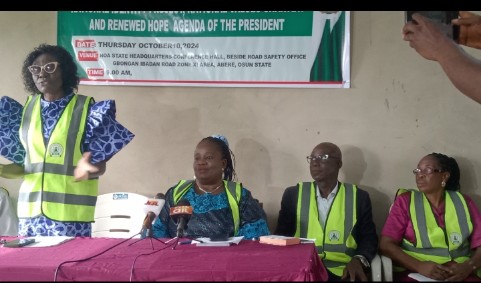In a bid to strengthen national unity and instill patriotism, the National Orientation Agency (NOA) has launched the National Values Charter, a framework designed to guide the actions of both government and citizens.
Speaking at a press conference in Osogbo, Mrs. Olorunfemi Olubukola, Director of the RCSI unit at NOA, representing the Director-General Mallam Lanre Issa-Onilu, emphasized the importance of this initiative in fostering national identity and responsible citizenship.
Related Posts:
- Implied Terms in Contracts: Balancing Freedom and Protection
- Osogbo Market Women Grapple as the Aftermath of Fuel…
- Thriving Against Odds: The Tale of Osogbo's Fruit Vendors
- Infractions Bothering on Employees’ Taxes & Payment…
- This Local Business Offers Women in Osogbo Financial…
Powered by Contextual Related Posts
Olubukola described the charter as a mutual agreement between the government and its citizens. “The charter is a mutual commitment between the country and its citizens to the national cause. The government must fulfill its basic non-negotiable promises in return for commitments from the citizens,” she stated.
The charter outlines seven promises made by the government, known as the Nigerian Promise, which includes equality, democracy, entrepreneurship and employment, peace and security, inclusivity, freedom and justice, and meritocracy.
Citizens, in turn, are expected to adhere to the Citizens Code, which calls for discipline, duty of care, tolerance and respect, leadership, transparency, environmental awareness, and resilience.
Olubukola stressed the importance of these values in “redirecting Nigerians toward the ideals and values for which we were traditionally known,” and highlighted the government’s efforts to embed these principles into national life.
Additionally, the government has mandated value orientation training for members of the Federal Executive Council, National Assembly, Judiciary, and other appointees as part of pre-resumption retreats. This, according to Olubukola, ensures that the highest levels of governance embody the same values expected of citizens.
Olubukola also announced significant changes regarding the National Anthem. She revealed that the Federal Executive Council had approved the use of the first stanza of the anthem at all official functions, while the full three stanzas would be reserved for special events such as Independence Day and Democracy Day. Furthermore, the third stanza has been adopted as the National Prayer to promote unity.
“The National Anthem evokes positive sentiments in citizens,” she remarked, “which can inspire patriotism and drive contributions toward building a great nation.” She urged citizens to familiarize themselves with the correct lyrics and embrace the anthem as a symbol of national pride.
Olubukola also discussed broader socio-economic reforms under the Federal Government’s Renewed Hope Agenda. These include the unification of the foreign exchange market, removal of fuel subsidies, and the creation of a Family Homes Fund to provide affordable housing. Additional initiatives such as the Nigeria Youth Investment Fund (NYIF) and the Nigerian Education Loan Fund (NELFUND) were highlighted, aimed at promoting youth entrepreneurship and providing educational loans to students.
She concluded by calling on citizens to exercise patience and support the government’s efforts, emphasizing the need for collective responsibility in nation-building.




